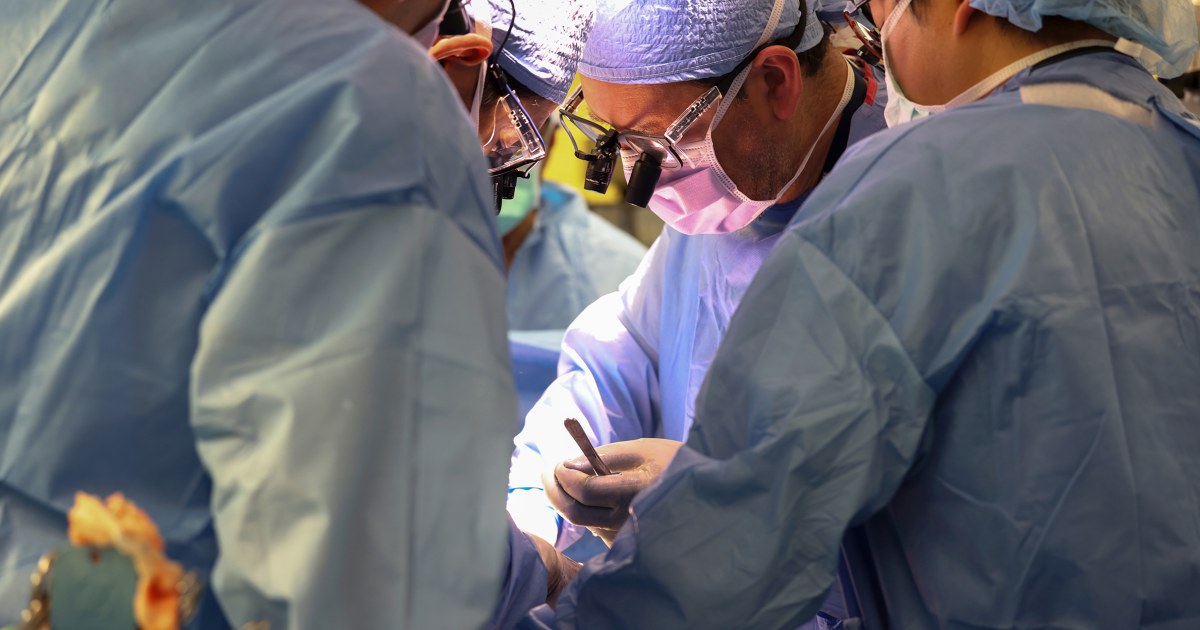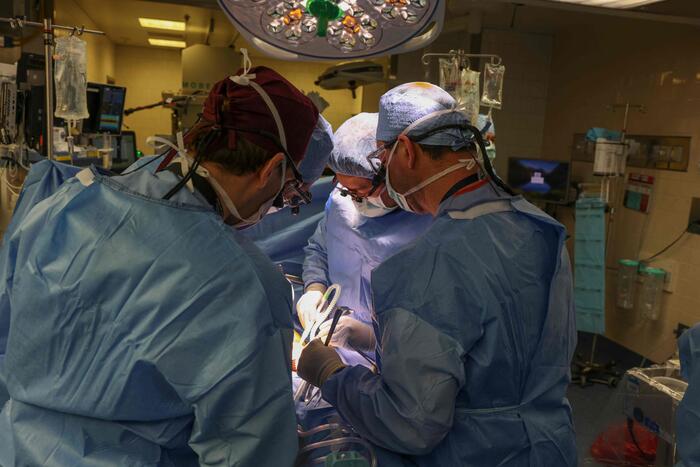There are people who are jokers even on their deathbed.
David Bennett, a 57-year-old American with extremely serious heart failure, was explained in mid-December that there were no spare human hearts for him, but that there was another desperate option: a transplant of an organ from a pig.
"Will I do oinc, oinc?" The patient replied with a joke, according to his surgeon, Bartley Griffith, to
The New York Times .
.
Today Bennett is the first human being to live with a pig heart beating in his chest, after surviving the groundbreaking operation, performed on January 7 at the University of Maryland Medical Center (USA).
And experts are now wondering what the next step will be for Revivicor, the company that is at the forefront of this revolution and has supplied the organ that once belonged to a pig and is now David Bennett's.
Once again a medical milestone that seemed like science fiction has been achieved until the day before.
Revivicor, however, has been working for two decades now.
The company, based in the American city of Blacksburg (Virginia), was founded in 2003 from the British company PPL Therapeutics, which was involved in the creation of
Dolly the sheep a quarter of a century ago.
, the first mammal cloned from an adult cell. In its facilities, Revivicor raises pigs that are the result of a true genetic goldsmith. Scientists inactivate a gene related to the growth of the heart, to facilitate its fit in the human chest, and block three other genes linked to the rapid production of defenses that cause the rejection of pig organs. In addition, Revivicor pigs have six human genes inserted into their genome to facilitate acceptance of their tissues by people.
The company's website presents pig organs as “products” in its catalog.
The brand of pig hearts is UHeart.
That of the pulmonary lobes, ULobe.
On September 25, a team of surgeons successfully transplanted a UKidney-brand Revivicor kidney to a brain-dead woman for the first time in an operating room at New York University.
David Bennett remains on constant watch in case his body ends up rejecting his UHeart heart.
David Bennett, third from left, poses with his family in a 2019 photo Byron Dillard (AP)
The nephrologist Rafael Matesanz, founder of the National Transplant Organization (ONT) of Spain, believes that the new advance is "very important news from a scientific point of view", but fears "crazy prices" and an absolute paradigm shift. to the current model of altruistic donation. “The problem would go from being the shortage of donors to being the economic cost for health systems. It's a fabulous business, "he warns.
Revivicor is now in the hands of businesswoman Martine Rothblatt, CEO of United Therapeutics, the US company that bought Revivicor in 2011 for just seven million euros. Rothblatt told her story in 2015 to
New York
magazine
, with this headline on the cover: "America's Highest Paid CEO Was A Man Before." Martine Rothblatt, a trans woman, made a fortune founding Sirius, a satellite radio service, and in 1996 she jumped into biomedicine creating United Therapeutics, after discovering that her young daughter suffered from pulmonary arterial hypertension, a rare and serious disease. His company has developed effective treatments for this ailment.
Rothblatt, as he explained in New York
magazine
, co-founded in 2004 "a trans religion", baptized Terasem, today turned into a foundation dedicated to investigating if it is possible to create "a conscious analogue of a person", from a "cyberconsciousness" transferable to a nanotechnological device.
In 2011, the price of Revivicor was low because the xenotransplantation sector - transplants between different species - accumulated failures in previous years.
In 2012, however, CRISPR appeared, a new gene editing technique that allows modifying animal genes quickly and cheaply.
That advance, alien to Revivicor, was the final push.
French biochemist Emmanuelle Charpentier and American chemist Jennifer Doudna won the 2020 Nobel Prize in Chemistry for discovering these molecular scissors.
The medical team prepares the transplant of a swine heart from Revivicor to David Bennett, in an operating room at the University of Maryland University of Maryland School of (EFE)
The Spanish chemist Marc Güell is one of the co-founders of eGenesis, a company born at Harvard University (USA) that is the competence of Martine Rothblatt's company. “Revivicor has been around for two decades. It has been a long-distance race and they are already coming. They are still number one ”, Güell admits sportily, recalling that in Germany and China there are also“ very powerful ”teams making progress independently. "We will see good news in the coming years," predicts the chemist, from Pompeu Fabra University, in Barcelona.
In 2020, some 120,000 organ transplants were performed on the planet, 18% less than the previous year, according to the world registry managed by the ONT, with data from 82 countries. The collapse was due to the collapse of health systems due to the covid pandemic, in a context of reduction of traffic accidents, a traditional source of organs. The number of deceased donors decreased by 13%. Of the 7,840 heart transplants registered, 278 were done in Spain.
A report by the Pontifical Academy of Sciences estimates that the available organs only cover one-tenth of the world's needs.
Marc Güell believes that pig parts are the closest solution to complete the deficiencies of the current model based on altruistic donations.
“It is a system that is not so beautiful from the point of view of solidarity, but right now I find it difficult to eliminate waiting lists without using some kind of radical innovation, because we are getting older and older, intensive care units are better at keep people alive and there are fewer and fewer traffic accidents.
The waiting lists for transplants are not going to be reduced ”, he believes.
With the organs of pigs, much more would be transplanted than now
Rafael Matesanz, founder of the National Transplant Organization
Matesanz expresses his doubts about how the US advances will be transferred to the European context. The pig heart transplant for David Bennett was authorized by the United States Food and Drug Administration (FDA), which had already approved Revivicor's genetic modification of pigs for food use a year ago. Called GalSafe, these pigs lack alpha-gal sugar on the surface of their cells, allowing their meat to be eaten by people with alpha-gal syndrome, a food allergy caused by a tick bite.
In Spain, Matesanz explains, the authorization of the operation would not have come from the drug regulatory agency, as in the US, but from the ONT. “There it is treated as a product that they try to manufacture in series. It's another war, ”emphasizes the nephrologist. Matesanz recalls that every year about 30 people (10%) die on the waiting list to receive a heart in Spain, although the real figure could be much higher if the requirements to be in that queue were relaxed. "If we had many more organs, more people would enter the waiting list," says the expert. This is what has happened with the new antiviral treatments against hepatitis C, so effective that they avoid the need for liver transplants and increase the availability of livers for other problems. "By having more livers,patients with other types of pathologies began to be transplanted. If we have more organs, we transplant more organs. And that would happen with pig organs: much more would be transplanted than now, ”says Matesanz.
Pablo Ramírez, head of General Surgery at the Virgen de la Arrixaca hospital in Murcia, believes that the initial indication for pig hearts could be "a bridge transplant, to give patients time in critical situations until the human organ arrives,"
says Daniel Mediavilla
. Ramírez explains that in Spain there were already two xenotransplantation programs from transgenic pigs to baboons, in Murcia and A Coruña, but "the trials were stopped because survival was not enough." For Ramírez, it could be time to reactivate the investigations.
You can write to us at
manuel@esmateria.com
or follow
MATERIA
on
,
,
or subscribe here to our
newsletter
.

/cloudfront-eu-central-1.images.arcpublishing.com/prisa/H4DJRUK6YRFYPH6O7LTO7GD47Q.jpg)







